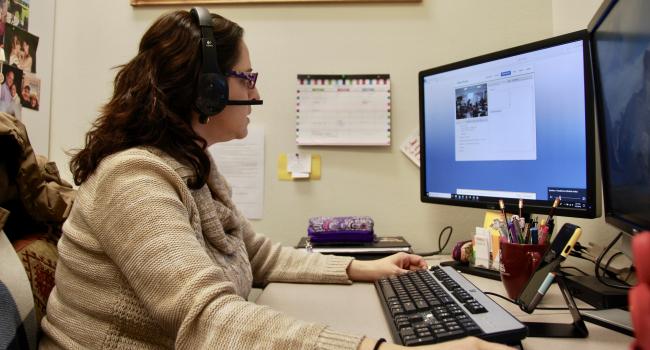
Jennifer Alexander, a teacher mentor, powers on her computer in Huntsville, Texas. A few minutes later, she’s watching a kindergarten teacher give a lesson on prediction and colors in her classroom in Brownsville, Texas — more than 400 miles away.
“Don’t forget to start your questioning strategies with timed thinking,” Ms. Alexander says into her headset’s microphone.
The teacher, who has an earbud tucked in her ear, nods and holds up the children’s book “Pete the Cat” so her students can clearly see the pages.
This is virtual mentoring and coaching (VMC) for teachers participating in Project English Language & Literacy Acquisition — Validation (ELLA-V), a five-year, Investing in Innovation (i3) validation study on English language development in grades kindergarten through three. While the project ended last year, the research team is currently conducting a sustainability study. Dr. Rafael Lara-Alecio, Regents Professor, serves as principal investigator (PI); Dr. Beverly J. Irby, College of Education & Human Development Associate Dean for Academic Affairs, and Dr. Fuhui Tong, associate professor, are his Co-PIs.
ELLA-V relies on large, high-tech Iris cameras placed in participating educators’ classrooms. During a scheduled VMC session, a mentor can securely access the camera through the custom ELLA-V online portal to observe the classroom. The camera has a cordless mic, worn by the teacher, connected to an earbud. In real time, the mentor observes classroom activity and instruction, providing instantaneous feedback to the teacher. The 20-minute VMC session, as well as video of the lesson, is recorded and saved inside the ELLA-V portal.
In addition to VMC, ELLA-V provides educators with virtual professional development (VPD) on English as a second language (ESL) strategies and instructional techniques to complement a specially designed curriculum to improve English academic language for English learners (ELs). Project coordinators and mentors deliver VPD through GoToTraining, an online training application from LogMeIn.
Building Fidelity
“The goal of the VMC is to support effective second language instructional strategies and provide teachers with real-time supportive feedback to improve fidelity of lessons,” said Laura Cajiao-Wingenbach, ELLA-V lead coordinator.
In order to assure fidelity, the research team looks to see if teachers are implementing the strategies and techniques they have learned through VPD. This includes instructional elements like pacing, classroom management, use of provided classroom materials, random calling on students, and more.
ELLA-V offers educators tiered instructional support, depending on their level of fidelity. Teachers needing help with lesson delivery receive additional VMC and possibly one-on-one coaching through GoToMeeting, a web-based conferencing program also from LogMeIn, where the mentor and educator review and discuss selected recordings of the teacher’s instruction.
Adapting to Virtual
A trainer for teachers and school administrators for 23 years, Ms. Alexander was a veteran mentor, but new to VMC at the start of the project. At first, the technology caused a bit of anxiety for her and some teachers, but this vanished over time.
“I adapted my training style to this medium. For one, I was keenly aware of my voice and how I provided feedback,” she said. “During the trainings, I reminded teachers that this was a long-term endeavor and that it was not expected that they would be perfect at the start, but they would develop their teaching skills with regard to second language instruction.”
Ms. Lorinda Ramirez, a first-grade teacher in Brownsville ISD, first joined ELLA-V three years ago. “I feel that the virtual mentoring and coaching is useful for new teachers starting in the program. It gives them a better understanding of what the program entails. I have also noticed teachers feel more comfortable after the coaching and mentoring they have received through the virtual coaching. It also allows teachers to ask questions directly and get immediate feedback,” she said.
Outcomes and Benefits
Through VMC and VPD, the quality of teachers’ instruction and student learning increases as the teachers apply what they learn.
“The majority of the teachers become high-level implementers of the strategies and mentioned that they were excited to the see the language development of their ELs. I also was excited that many teachers said they were using the strategies in other content areas,” Ms. Alexander said.
Ms. Cajiao-Wingenbach echoed this: “Many of the teachers noted that when they used the strategies, they saw more confidence in their ELs to speak in English and improvement in writing skills.
VMC creates exciting new opportunities for mentors to connect with teachers, anywhere at anytime.
“I could not have provided the same level of training/mentoring support even if all the teachers had been in one district, let alone across the state of Texas, without the technology,” Ms. Alexander said.
###
This story originally appeared in Transform Lives.




